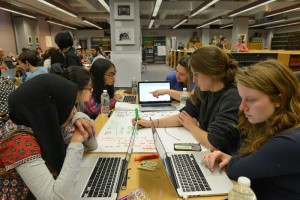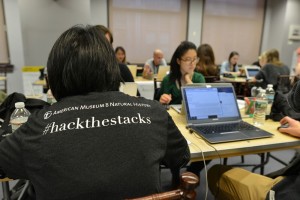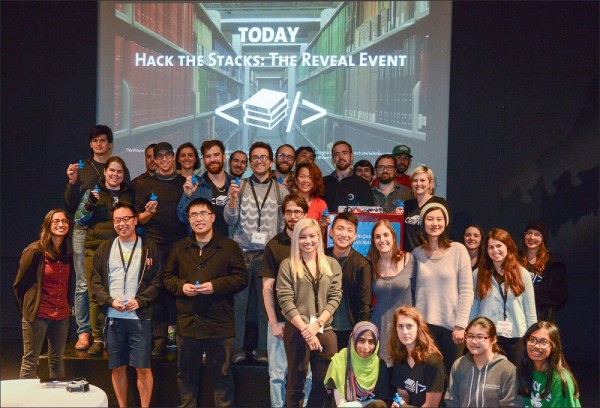American Museum of Natural History Hackathon Tackles 21st Century Library Challenges
On November 18–20, the American Museum of Natural History (AMNH) hosted “Hack the Stacks,” a solution-building event where over 100 developers, programmers, and others with a passion for computer science worked overnight to develop innovative solutions for the challenges faced by modern libraries and archives. The goal was to animate, organize, and enable greater access to the increasing body of digitized content produced by the AMNH Library.

Teacher Rafa Weiman-Kelman (r. corner) works with Brown Scholars in AMNH’s BridgeUp: STEM program
(©AMNH/D. Finnin)
HACKING THE STACKS

Programmers, developers and others with a passion for computer science worked through the night in the AMNH Library
(©AMNH/D. Finnin)
- “Why Didn't I Think Of That?” Award (most original approach to a challenge)
- The Evolution of Darwin’s Notes Challenge: use machine learning to piece together 25,000 digital images from Charles Darwin’s handwritten scientific notes, housed in the repository of the Darwin Manuscripts Project at AMNH
- Solution: Team DarWIN used computer vision scripts to analyze and match the edges of Darwin’s various notes, many of which constituted the raw material for On the Origin of Species and his other works
- Team: Robert Carlsen, Jin Chung, Zach Gottlieb, Mike Heaton, Luis Ibanez, David Lichtenberg, Jacob Peacock, Sofia-Jeanne Roggeveen, Nathan Schucher, Danielle Sobel, Marko Stamenovic, Michelle Steigerwalt, Mariano Trebino, Harold Treen
- “Data Buster” Award (greatest potential for tackling big data sets)
- API Challenge: create an easy-to-use and accessible API portal that enables better and faster access to specific types of resources across all of the library’s systems
- Solution: by creating a simple module that allows one to query multiple data sources at once, the API Portal Team developed a prototype that can make the library’s digital content available as machine-readable data, not only enabling data sharing within the museum, but also with other institutions
- Team: Jonah Blumstein, Evan Hammer, Tom Lavenziano, Jesse Lee, Joseph Spens, Alex Washburn
- “Reach For The Stars” Award (most promise to educate learners of all ages)
- Cabinet of Curiosities Challenge: build a fun and engaging experience that draws on physical items in the Museum’s library and special collections
- Solution: using Illustrations of Exotic Entomology by Dru Drury, Team Nonsense developed ButterFly Effect, an immersive virtual reality experience that allows users to “dive into” the rare book—originally published in 1837—and bring its butterflies to life
- Team NonSense: Phansa Chaonpoj, Will Field, Kevin Gong, Jackie Hurwitz, Shan Liu, Will Wurtzebach
- “Labcoat Knockout” Award (greatest potential to change the nature of scientific or library research)
- Library Metasearch Challenge: develop a unified interface to browse all internal and external library reference descriptions
- Solution: with an easy-to-use, straightforward web portal, the One Big Search team developed a module for searching across all AMNH datastores by either keyword or free text
- Team: Amy Ciavolino, Fiona Condon, Chris Fairbanks, Sophie Haskins, Amanda Pickering

“Hack the Stacks” award recipients at public reveal event, November 20, 2016
(©AMNH/R. Mickens)
Tom Baione is Harold Boeschenstein Director, Department of Library Services at AMNH
RELATED
RECOMMENDED
TECHNOLOGY
ALREADY A SUBSCRIBER? LOG IN
We are currently offering this content for free. Sign up now to activate your personal profile, where you can save articles for future viewing









Add Comment :-
Comment Policy:
Comment should not be empty !!!